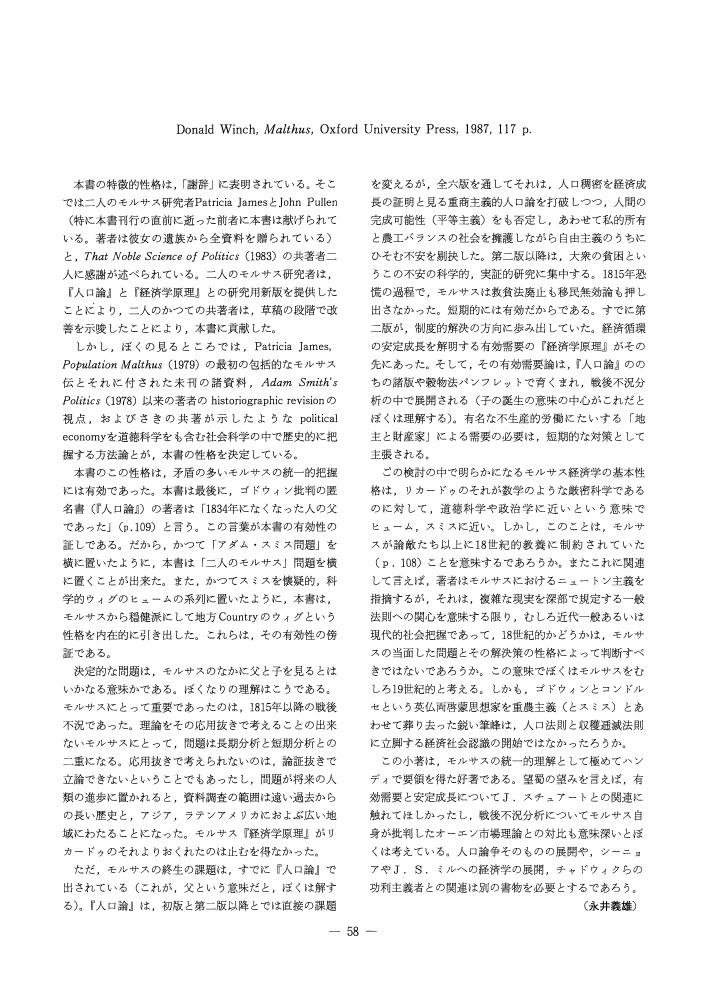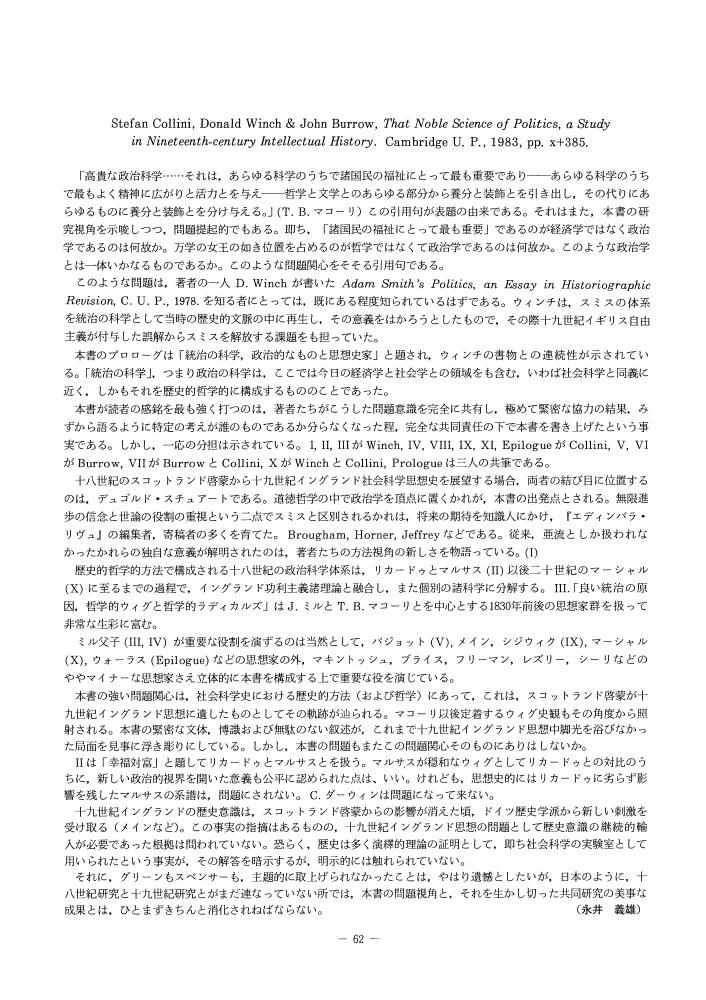1 0 0 0 OA 書評
1 0 0 0 OA 書評
1 0 0 0 OA オウエンとベンサムとかれらの周辺
- 著者
- 永井 義雄
- 出版者
- The Japanese Society for the History of Economic Thought
- 雑誌
- 経済学史学会年報 (ISSN:04534786)
- 巻号頁・発行日
- vol.38, no.38, pp.52-58, 2000 (Released:2010-08-05)
Studying Robert Owen (1771-1858), an utopian socialist, was the starting point of my research activity in 1954 and later, on the basis of my studies of Owen, I extended my research to include a forerunner of the Scottish Historical School (Robert Wallace), now the so-called Scottish Enlightenment, the eighteenth century Lockian radicalism (Price, Priestley and Cartwright), and the nineteenth century Philosophic Radicalism (Bentham). Rivalry of the East and the West for nearly half a century and splits of Marxism were the main causes of regulating my point of view, leading me to take an a-political academic approach toward the historical studies, which made it possible for me to stress the significance of utopian socialism and utilitarianism, both of which have long been despised and neglected by the Marxists. The so-called utopian socialism could not be called utopian, for it was the quite practical scheme for putting into practice co-operative communities all over the world, the first of which was the New Harmony experiment. My point was that Owen's theory was destined to fail on account of its incomplete theory of re-production, though his ideas of co-operation and harmony should still be held in high estimation. Utilitarianism, misunderstood by Marx as just an egoism, on the other hand, was practically the philosophy and an integrated system of jurisprudence that included civil, penal, finance and economic principles of legislation, which included an embryo of the welfare policies in the market system. Bentham was more eager to make minimum the duties of the state than Smith was, and even more earnest in making a safety net for the defeated in the system of free competition. Owen was a follower of Bentham in the idea of the greatest happiness principle.
- 著者
- 永井 義雄 田中 真晴
- 出版者
- 経済学史学会
- 雑誌
- 経済学史学会年報 (ISSN:04534786)
- 巻号頁・発行日
- vol.36, no.36, pp.160-162, 1998 (Released:2010-08-05)
- 著者
- 永井 義雄
- 出版者
- The Japanese Society for the History of Economic Thought
- 雑誌
- 経済学史学会年報 (ISSN:04534786)
- 巻号頁・発行日
- vol.27, no.27, pp.58, 1989 (Released:2010-08-05)
1 0 0 0 OA 経済学史・社会思想史関係書誌-予備調査
- 著者
- 今井 義夫 内田 博 岸川 富士夫 近田 錠二 永井 義雄 堀田 誠三
- 出版者
- The Japanese Society for the History of Economic Thought
- 雑誌
- 経済学史学会年報 (ISSN:04534786)
- 巻号頁・発行日
- vol.26, no.26, pp.14-27, 1988 (Released:2010-08-05)
1 0 0 0 OA 杉山忠平編『自由貿易と保護主義』法政大学出版局, 1985, x+234+vi pp.
- 著者
- 永井 義雄
- 出版者
- 経済学史学会
- 雑誌
- 経済学史学会年報 (ISSN:04534786)
- 巻号頁・発行日
- vol.24, no.24, pp.67, 1986 (Released:2010-08-05)
- 著者
- 永井 義雄
- 出版者
- The Japanese Society for the History of Economic Thought
- 雑誌
- 経済学史学会年報 (ISSN:04534786)
- 巻号頁・発行日
- vol.23, no.23, pp.62, 1985 (Released:2010-08-05)
1 0 0 0 功利主義の歴史的意義と現実的課題の研究
3年間にわたる本研究の最大の目標の1つは、功利(公益)主義の古典原典、それも出来れば未刊の草稿に遡って研究を拡大、深化させ、その成果を国際的に問うことであった。幸い、ベンサム草稿のマイクロ・フィルムを一括購入出来、ロンドン以外でこれを持つのは、日本が最初ということになった。永井、音無、有江、深貝、堀田、桜井、市岡、近藤、立川らは、これによって研究をすすめ、前6名は、その成果を第5回国際功利(公益)主義学会(ニューオーリンズ、1997年3月)で発表した。その後、研究協力を仰いだ坂井、奥野、児玉らがこの線にそって新たに研究を開始している。他方、いま1つの目標は、実践道徳として今日生きている功利(公益)主義が理論的、実践的にいかに機能しているかを確認し、今後さらに人類の福祉と地球環境の保護のために功利(公益)主義をいかに理論的、実践的に展開していくべきかを、考察することであった。この点でも、もちろん、国際交流は必要であって、山内は、オーストラリア国立大のシンガー教授と連携しつつ、生命倫理の問題で研究を深め、樫(研究協力者)もシンガー教授の著書を翻訳して、この面での功利(公益)主義的思考の意義を広めた。理論面では、永井、有江、深貝の3名は、1996年9月、ロンドン大学において、バリー教授の著書(Brain Barry,Justice as impartiality)をめぐっての、日英合同研究会に参加し、それぞれおよそ、1時間半の質疑応答をおこなった。これには、バリー教授自身が参加したのみならず、ローゼン教授、スコフィールド、ケリ-、クリスプ各博士など、約15名がイギリス側から討議に参加し、日本側には他5名が参加した。こうした研究会活動の結果、およそ、国際学会における日本からの発信については、国際的に一定の評価を受け、日英合同研究会の基礎も、一応固まったように思える。若手の研究者も、現れつつあり、今後の一層の理論的、実践的展開が期待される。1998年7月、待望の日本功利(公益)主義学会が旗揚げ出来るようになったのも、3年にわたる本研究補助があり、そのお蔭で研究会を継続できたからである。







